Ökonometrische Methoden für wirtschaftliche Prognosen und Simulationen
Der Forschungsschwerpunkt der Forschungsgruppe liegt in der Entwicklung ökonometrischer Methoden für Kurzfristprognosen (Reduzierte-Form-Modelle), für Regionalisierung und für Langfristprojektionen sowie für strukturelle Prognose- und Simulationsmodelle (DSGE-Modelle). Ferner erstellt sie ökonometrische Hintergrundanalysen für die Prognosetätigkeit der Forschungsgruppe Makroökonomische Analysen und Prognosen. Im Rahmen von Drittmittelprojekten wurden verschiedene makroökonomische Modelle, bspw. für die Volkswagen Financial Services AG oder im Rahmen von GIZ-Projekten für die Wirtschaftsministerien in Kirgistan und Tadschikistan sowie das Institut für makroökonomische Prognosen und Forschung (IFMR) in Usbekistan entwickelt.
IWH-Datenprojekt: IWH Real-time Database
Forschungscluster
Wirtschaftliche Dynamik und StabilitätIhr Kontakt

- Abteilung Makroökonomik
PROJEKTE
07.2022 ‐ 12.2026
Evaluierung des InvKG und des Bundesprogrammes STARK
Bundesministerium für Wirtschaft und Klimaschutz (BMWK)
Im Auftrag des Bundesministeriums für Wirtschaft und Klimaschutz evaluieren das IWH und das RWI die Verwendung der rund 40 Milliarden Euro, mit denen der Bund die Kohleausstiegsregionen unterstützt.
12.2024 ‐ 02.2026
Macroeconomic Modelling for Energy Investments in Vietnam
Deutsche Gesellschaft für Internationale Zusammenarbeit (GIZ) GmbH
08.2024 ‐ 03.2025
Strengthening Public Financial Management in Vietnam
Deutsche Gesellschaft für Internationale Zusammenarbeit (GIZ) GmbH
01.2023 ‐ 12.2023
Frühzeitige Ermittlung stabiler Ergebnisse zum Bruttoinlandsprodukt bzw. realen Wirtschaftswachstum und der Bruttowertschöpfung auf Länderebene
Landesbetrieb Information und Technik Nordrhein-Westfalen
Das Projekt prüft, ob die Genauigkeit der ersten Schätzung der Bruttowertschöpfung und des Bruttoinlandsprodukts für die Bundesländer erhöht und damit das Ausmaß der nachfolgenden Revisionen reduziert werden kann.
01.2018 ‐ 12.2023
EuropeAid (EU-Rahmenvertrag)
Europäische Kommission
05.2020 ‐ 09.2023
ENTRANCES: Energy Transitions from Coal and Carbon: Effects on Societies
Europäische Kommission
Ziel von ENTRANCES ist es, die Folgen des Kohleausstiegs in Europa zu untersuchen. Wie verändert der Kohleausstieg die Gesellschaft – und wie kann Politik darauf reagieren?
This project has received funding from the European Union’s Horizon 2020 research and innovation programme under grant agreement No 883947.
10.2019 ‐ 01.2023
An Klimawandel angepasste Wirtschaftsentwicklung
Deutsche Gesellschaft für Internationale Zusammenarbeit (GIZ) GmbH
Der Klimawandel wirkt sich stark auf das Wirtschaftswachstum und die Entwicklung eines Landes aus. Das erhöht den Bedarf an verlässlichen und realisierbaren Ansätzen, mit denen die Auswirkungen von Klimarisiken und potenzielle Anpassungsszenarien bewertet werden können. Die politischen Entscheidungsträger*innen in den Planungs- und Wirtschaftsministerien benötigen fundierte Prognosen, um entsprechende wirtschaftspolitische Instrumente zu konzipieren, zu finanzieren und aktiv gegenzusteuern. In den Pilotländern Kasachstan, Vietnam und Georgien werden Klimarisiken bei der makroökonomischen Modellierung berücksichtigt. Die Ergebnisse werden so in den Politikprozess integriert, dass angepasste Wirtschaftsplanungen entstehen können. Das IWH-Team ist verantwortlich für die makroökonomische Modellierung in Vietnam.
07.2016 ‐ 12.2018
Klimaschutz und Kohleausstieg: Politische Strategien und Maßnahmen bis 2030 und darüber hinaus
Umweltbundesamt (UBA)
01.2017 ‐ 12.2017
Unterstützung einer nachhaltigen Wirtschaftsentwicklung in ausgewählten Regionen Usbekistans
Deutsche Gesellschaft für Internationale Zusammenarbeit (GIZ) GmbH
01.2017 ‐ 12.2017
Short-term Macroeconomic Forecasting Model in Ministry of Economic Development and Trade of Ukraine
Deutsche Gesellschaft für Internationale Zusammenarbeit (GIZ) GmbH
01.2016 ‐ 12.2017
Entwicklung eines analytischen Tools basierend auf einer Input-Output-Tabelle
Deutsche Gesellschaft für Internationale Zusammenarbeit (GIZ) GmbH
Das Ziel des Projektes war die Entwicklung eines Exceltools zur Wirkungsanalyse von Politikmaßnahmen in Tadschikistan basierend auf dem statischen Input-Output-Ansatz.
11.2015 ‐ 12.2016
Beschäftigung und Entwicklung in der Republik Usbekistan
Deutsche Gesellschaft für Internationale Zusammenarbeit (GIZ) GmbH
Förderung einer nachhaltigen wirtschaftlichen Entwicklung in ausgewählten Regionen Usbekistans
05.2016 ‐ 05.2016
Rahmenbedingungen und Finanzierungsmöglichkeiten für die Entwicklung des Privatsektors in Tadschikistan
Deutsche Gesellschaft für Internationale Zusammenarbeit (GIZ) GmbH
02.2016 ‐ 04.2016
Makroökonomische Reformen und umwelt- und sozialverträgliches Wachstum in Vietnam
Deutsche Gesellschaft für Internationale Zusammenarbeit (GIZ) GmbH
10.2015 ‐ 03.2016
Improved Evidence-based Policy Making - GIZ Tadschikistan
Deutsche Gesellschaft für Internationale Zusammenarbeit (GIZ) GmbH
Referierte Publikationen
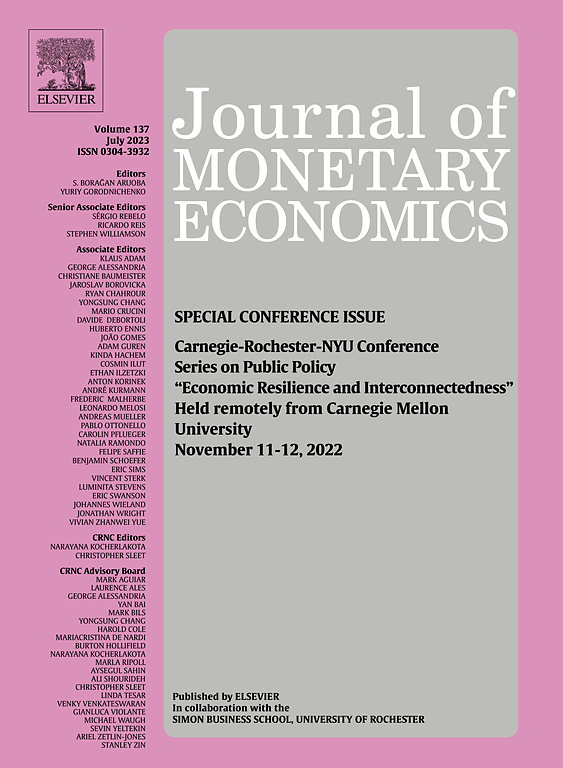
Resolving the Missing Deflation Puzzle
in: Journal of Monetary Economics, March 2022
Abstract
A resolution of the missing deflation puzzle is proposed. Our resolution stresses the importance of nonlinearities in price- and wage-setting when the economy is exposed to large shocks. We show that a nonlinear macroeconomic model with real rigidities resolves the missing deflation puzzle, while a linearized version of the same underlying nonlinear model fails to do so. In addition, our nonlinear model reproduces the skewness of inflation and other macroeconomic variables observed in post-war U.S. data. All told, our results caution against the common practice of using linearized models to study inflation and output dynamics.
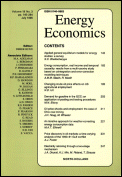
Power Generation and Structural Change: Quantifying Economic Effects of the Coal Phase-out in Germany
in: Energy Economics, 2021
Abstract
In the fight against global warming, the reduction of greenhouse gas emissions is a major objective. In particular, a decrease in electricity generation by coal could contribute to reducing CO2 emissions. We study potential economic consequences of a coal phase-out in Germany, using a multi-region dynamic general equilibrium model. Four regional phase-out scenarios before the end of 2040 are simulated. We find that the worst case phase-out scenario would lead to an increase in the aggregate unemployment rate by about 0.13 [0.09 minimum; 0.18 maximum] percentage points from 2020 to 2040. The effect on regional unemployment rates varies between 0.18 [0.13; 0.22] and 1.07 [1.00; 1.13] percentage points in the lignite regions. A faster coal phase-out can lead to a faster recovery. The coal phase-out leads to migration from German lignite regions to German non-lignite regions and reduces the labour force in the lignite regions by 10,100 [6300; 12,300] people by 2040. A coal phase-out until 2035 is not worse in terms of welfare, consumption and employment compared to a coal-exit until 2040.
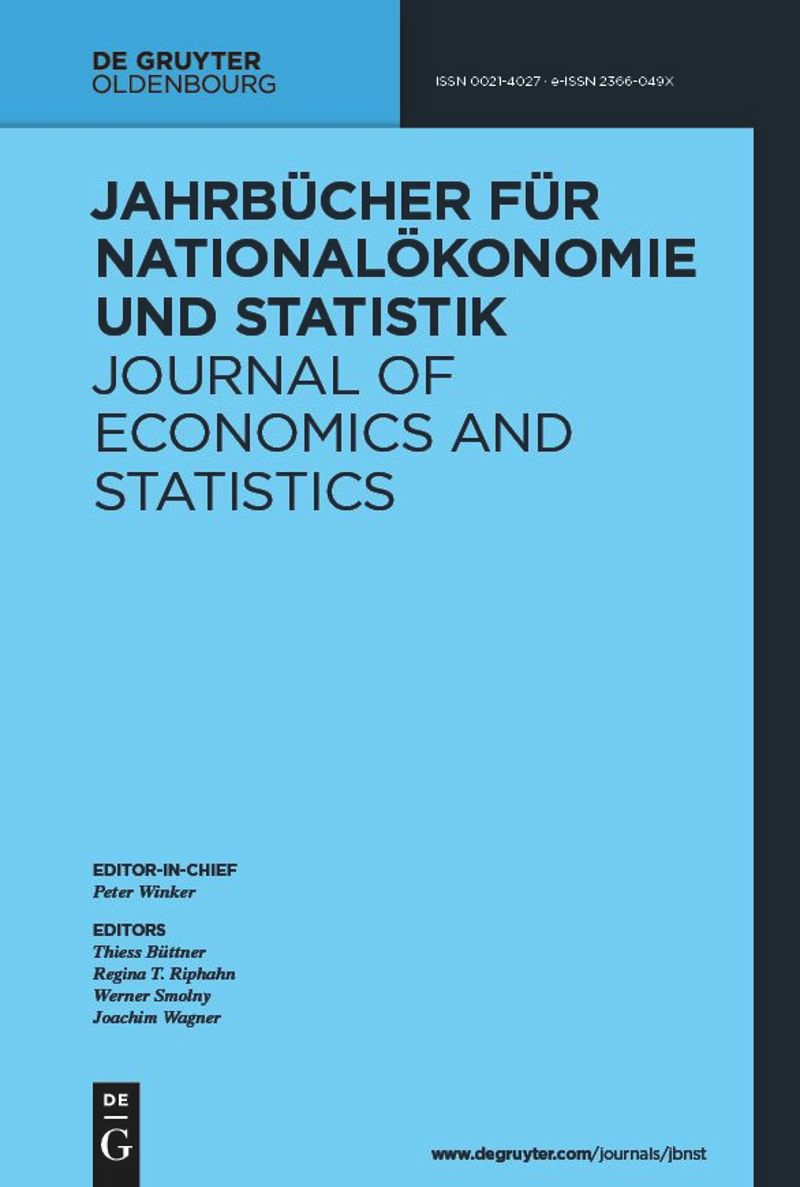
(Since when) are East and West German Business Cycles Synchronised?
in: Jahrbücher für Nationalökonomie und Statistik, Nr. 1, 2021
Abstract
We analyze whether, and since when, East and West German business cycles are synchronised. We investigate real GDP, unemployment rates and survey data as business cycle indicators and we employ several empirical methods. Overall, we find that the regional business cycles have synchronised over time. GDP-based indicators and survey data show a higher degree of synchronisation than the indicators based on unemployment rates. However, synchronisation among East and West German business cycles seems to have become weaker again recently.

Switching to Good Policy? The Case of Central and Eastern European Inflation Targeters
in: Macroeconomic Dynamics, Nr. 8, 2020
Abstract
The paper analyzes how actual monetary policy changed following the official adoption of inflation targeting in the Czech Republic, Hungary, and Poland and how it affected the volatilities of important macroeconomic variables in the years thereafter. To disentangle the effects of the policy shift from exogenous changes in the volatilities of these variables, a Markov-switching dynamic stochastic general equilibrium model is estimated that allows for regime switches in the policy parameters and the volatilities of shocks hitting the economies. Whereas estimation results reveal periods of high and low volatility for all three economies, the presence of different policy regimes is supported by the underlying data for the Czech Republic and Poland, only. In both economies, monetary policy switched from weak and unsystematic to strong and systematic responses to inflation dynamics. Simulation results suggest that the policy shifts of both central banks successfully reduced inflation volatility in the following years. The observed reduction in output volatility, on the other hand, is attributed more to a reduction in the size of external shocks.

The Effects of Fiscal Policy in an Estimated DSGE Model – The Case of the German Stimulus Packages During the Great Recession
in: Macroeconomic Dynamics, Nr. 6, 2020
Abstract
In this paper, we analyze the effects of the stimulus packages adopted by the German government during the Great Recession. We employ a standard medium-scale dynamic stochastic general equilibrium (DSGE) model extended by non-optimizing households and a detailed fiscal sector. In particular, the dynamics of spending and revenue variables are modeled as feedback rules with respect to the cyclical components of output, hours worked and private investment. Based on the estimated rules, fiscal shocks are identified. According to the results, fiscal policy, in particular public consumption, investment, and transfers prevented a sharper and prolonged decline of German output at the beginning of the Great Recession, suggesting a timely response of fiscal policy. The overall effects, however, are small when compared to other domestic and international shocks that contributed to the economic downturn. Our overall findings are not sensitive to considering fiscal foresight.
Arbeitspapiere
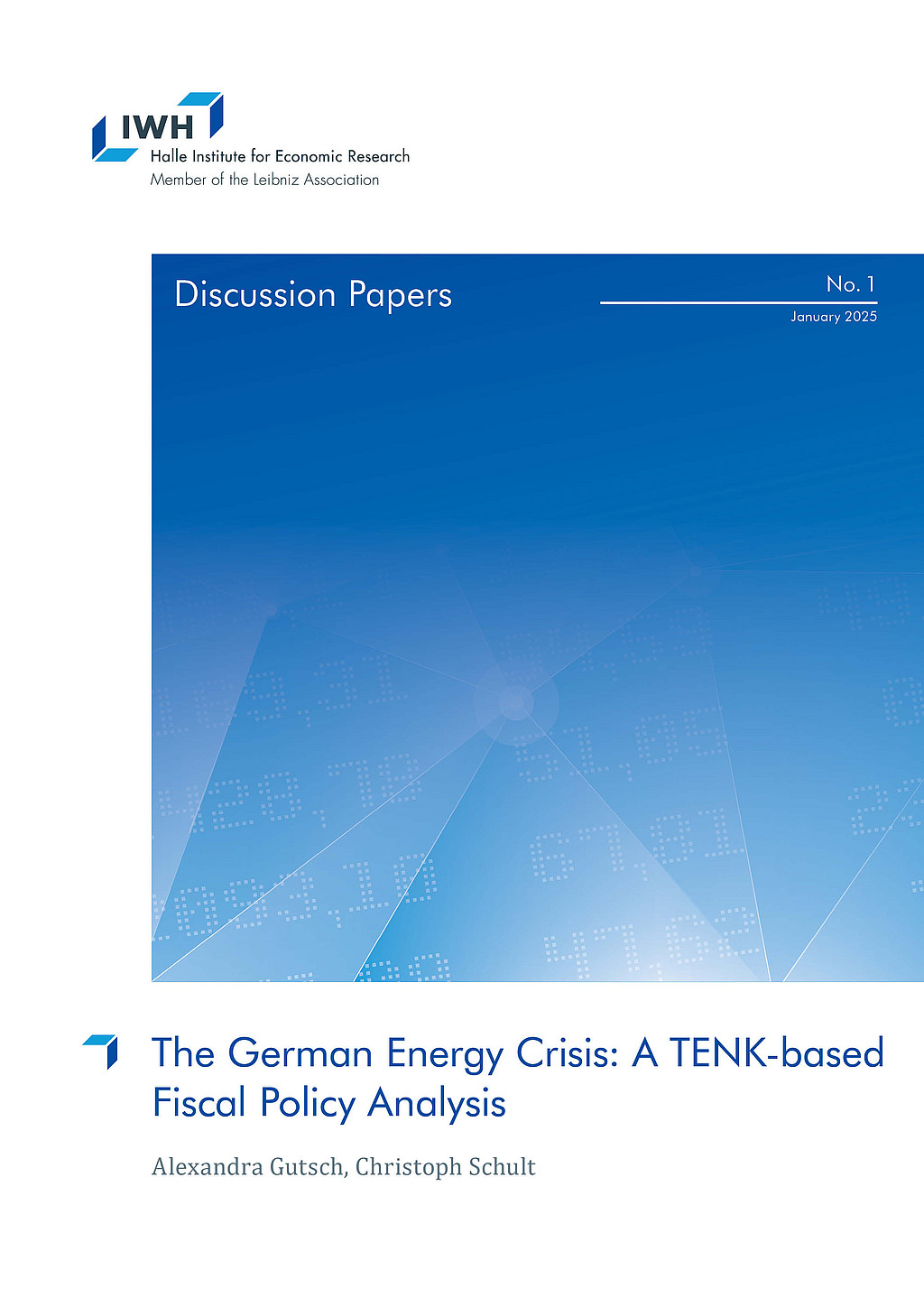
The German Energy Crisis: A TENK-based Fiscal Policy Analysis
in: IWH Discussion Papers, Nr. 1, 2025
Abstract
<p>We study the aggregate, distributional, and welfare effects of fiscal policy responses to Germany’s energy crisis using a novel Ten-Agents New-Keynesian (TENK) model. The energy crisis, compounded by the COVID-19 pandemic, led to sharp increases in energy prices, inflation, and significant consumption disparities across households. Our model, calibrated to Germany’s income and consumption distribution, evaluates key policy interventions, including untargeted and targeted transfers, a value-added tax cut, energy tax reductions, and an energy cost brake. We find that untargeted transfers had the largest short-term aggregate impact, while targeted transfers were most cost-effective in supporting lower-income households. Other instruments, as the prominent energy cost brake, yielded comparably limited welfare gains. These results highlight the importance of targeted fiscal measures in addressing distributional effects and stabilizing consumption during economic crises.</p>
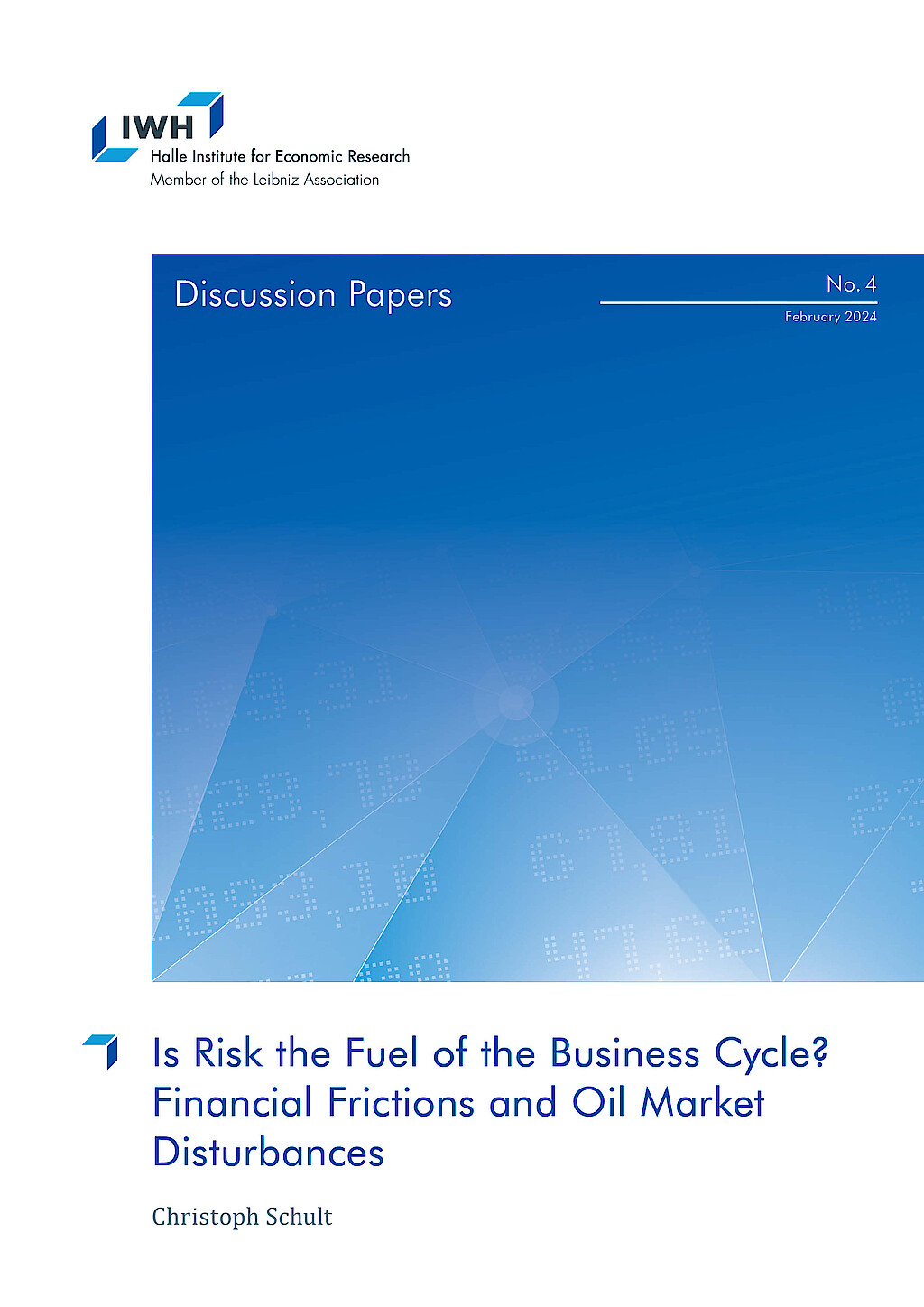
Is Risk the Fuel of the Business Cycle? Financial Frictions and Oil Market Disturbances
in: IWH Discussion Papers, Nr. 4, 2024
Abstract
I estimate a dynamic stochastic general equilibrium (DSGE) model for the United States that incorporates oil market shocks and risk shocks working through credit market frictions. The findings of this analysis indicate that risk shocks play a crucial role during the Great Recession and the Dot-Com bubble but not during other economic downturns. Credit market frictions do not amplify persistent oil market shocks. This result holds as long as entry and exit rates of entrepreneurs are independent of the business cycle.
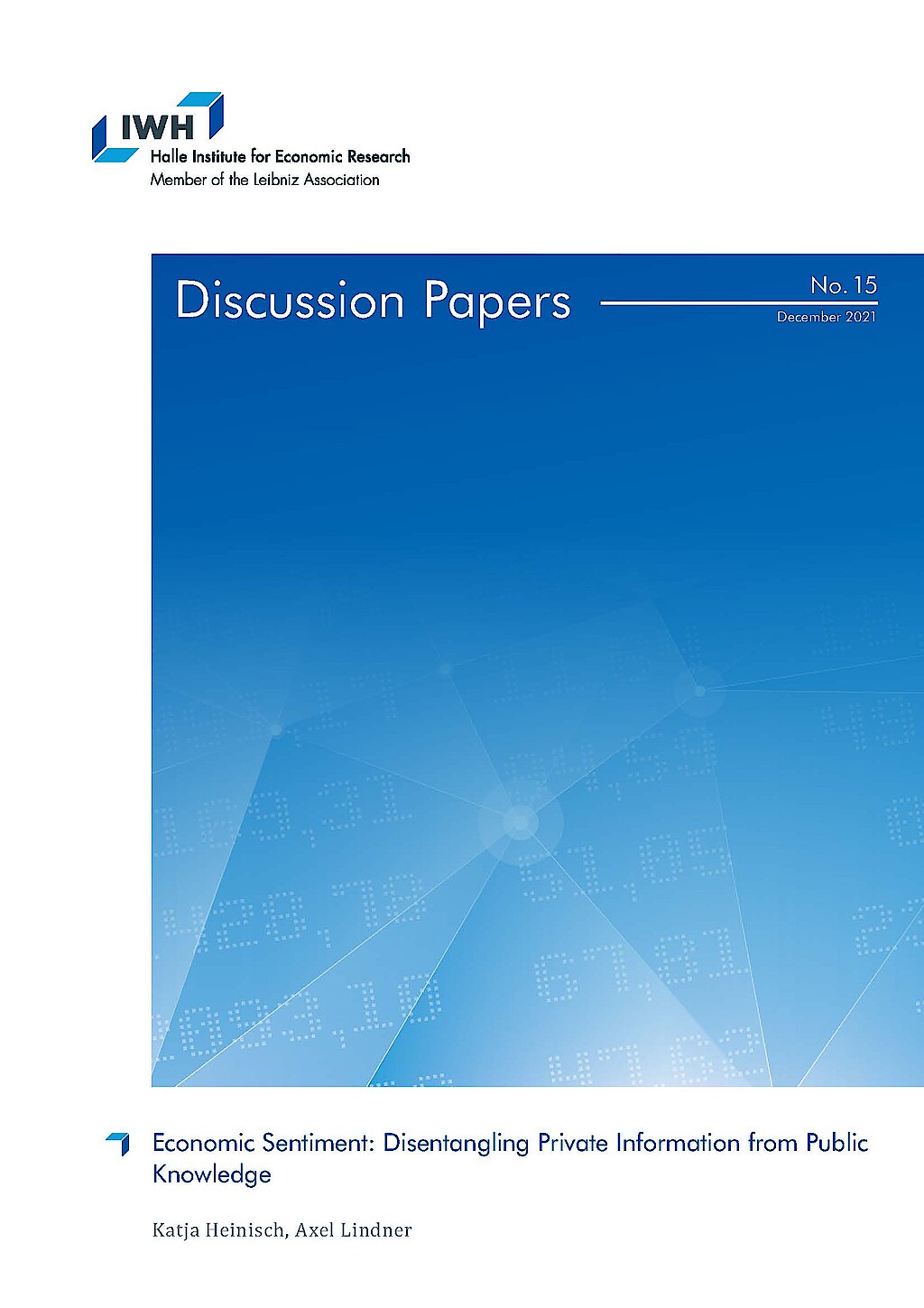
Economic Sentiment: Disentangling Private Information from Public Knowledge
in: IWH Discussion Papers, Nr. 15, 2021
Abstract
This paper addresses a general problem with the use of surveys as source of information about the state of an economy: Answers to surveys are highly dependent on information that is publicly available, while only additional information that is not already publicly known has the potential to improve a professional forecast. We propose a simple procedure to disentangle the private information of agents from knowledge that is already publicly known for surveys that ask for general as well as for private prospects. Our results reveal the potential of our proposed technique for the usage of European Commissions‘ consumer surveys for economic forecasting for Germany.
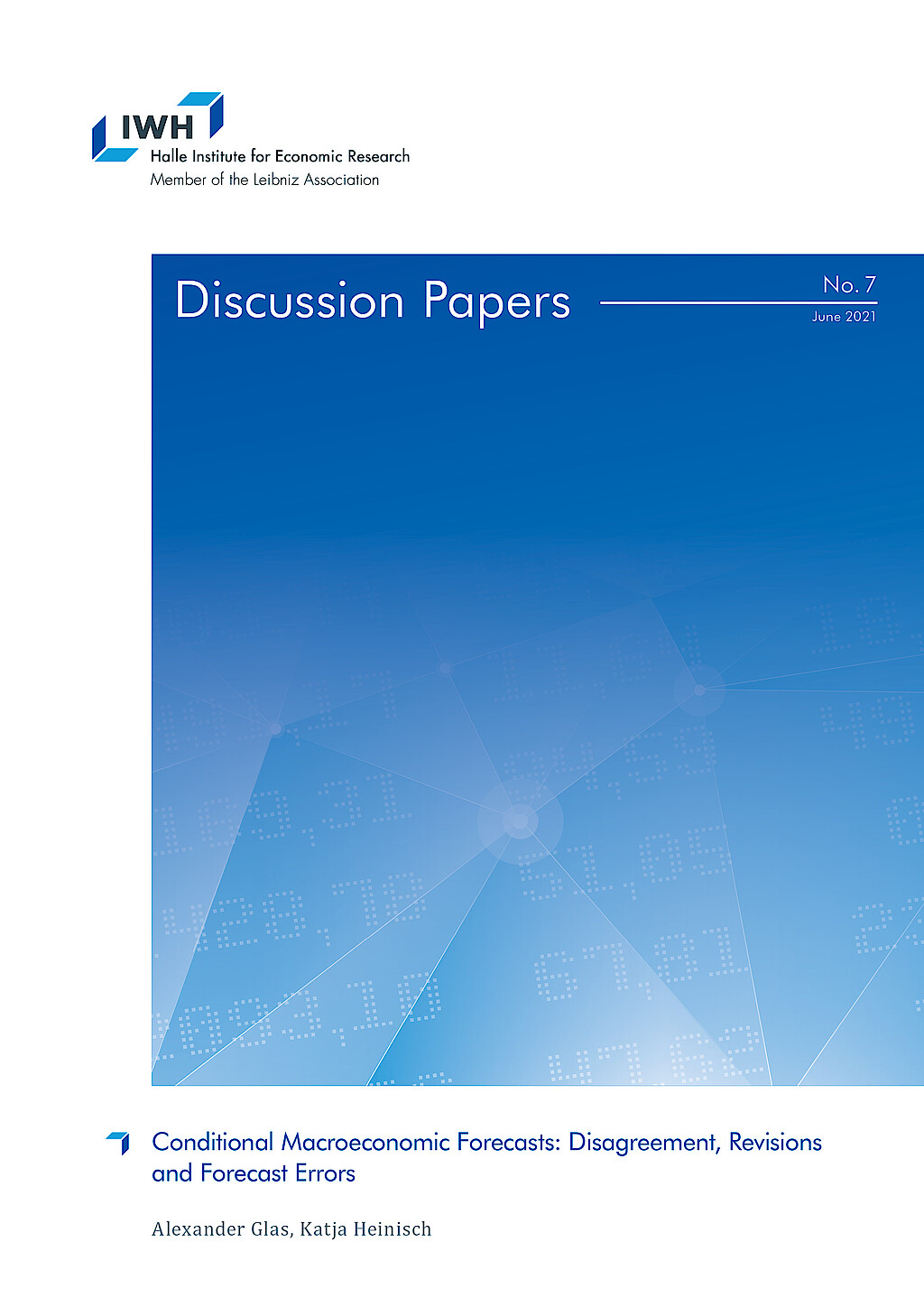
Conditional Macroeconomic Forecasts: Disagreement, Revisions and Forecast Errors
in: IWH Discussion Papers, Nr. 7, 2021
Abstract
Using data from the European Central Bank‘s Survey of Professional Forecasters, we analyse the role of ex-ante conditioning variables for macroeconomic forecasts. In particular, we test to which extent the heterogeneity, updating and ex-post performance of predictions for inflation, real GDP growth and the unemployment rate are related to assumptions about future oil prices, exchange rates, interest rates and wage growth. Our findings indicate that inflation forecasts are closely associated with oil price expectations, whereas expected interest rates are used primarily to predict output growth and unemployment. Expectations about exchange rates and wage growth also matter for macroeconomic forecasts, albeit less so than oil prices and interest rates. We show that survey participants can considerably improve forecast accuracy for macroeconomic outcomes by reducing prediction errors for external conditions. Our results contribute to a better understanding of the expectation formation process of experts.
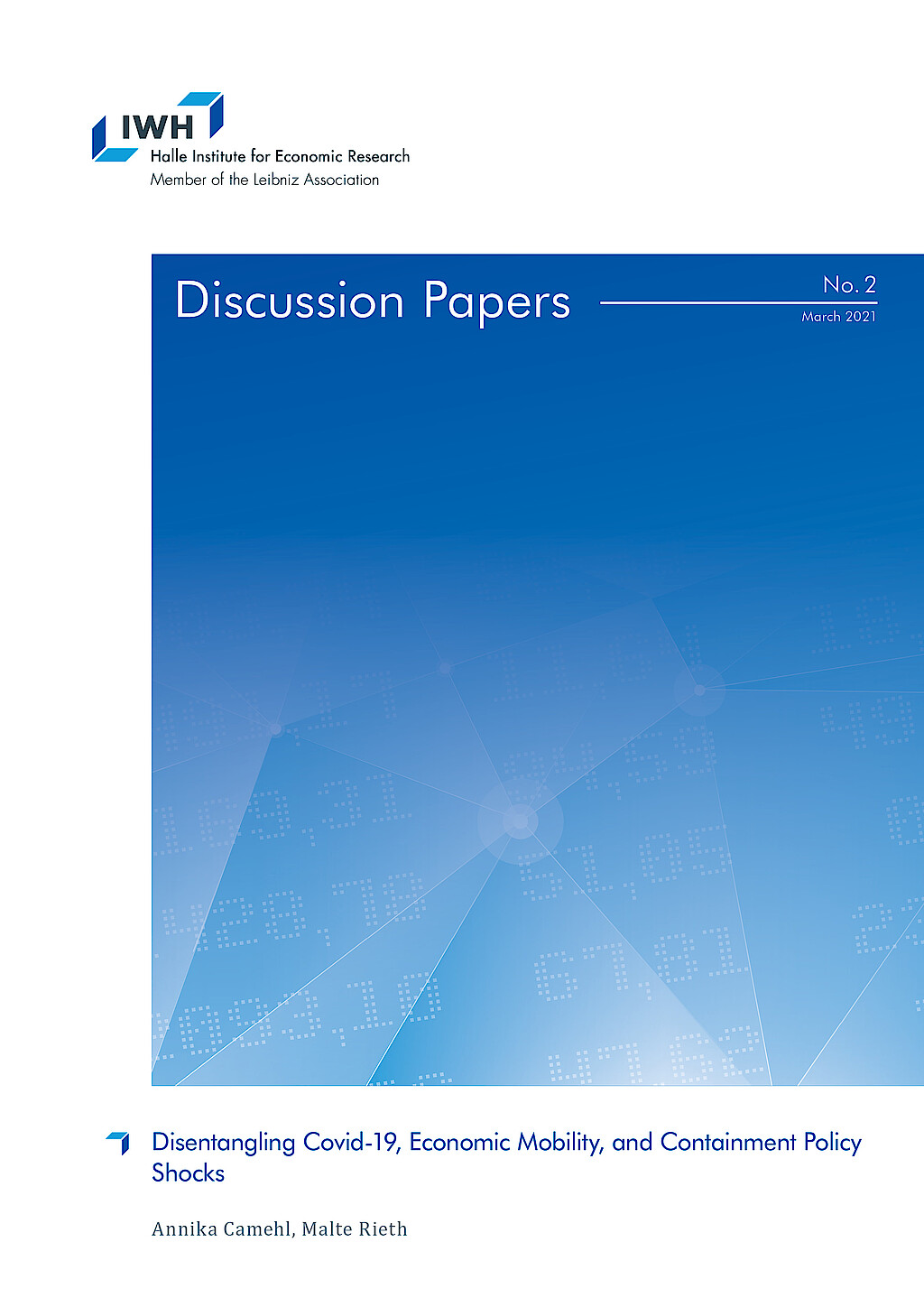
Disentangling Covid-19, Economic Mobility, and Containment Policy Shocks
in: IWH Discussion Papers, Nr. 2, 2021
Abstract
We study the dynamic impact of Covid-19, economic mobility, and containment policy shocks. We use Bayesian panel structural vector autoregressions with daily data for 44 countries, identified through sign and zero restrictions. Incidence and mobility shocks raise cases and deaths significantly for two months. Restrictive policy shocks lower mobility immediately, cases after one week, and deaths after three weeks. Non-pharmaceutical interventions explain half of the variation in mobility, cases, and deaths worldwide. These flattened the pandemic curve, while deepening the global mobility recession. The policy tradeoff is 1 p.p. less mobility per day for 9% fewer deaths after two months.


























